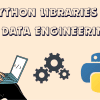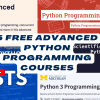Latest Posts |
|---|
|
From Our Partners |
|---|
More Recent Posts
- How to Standout and Safeguard Your Job in the Generative AI Era
- 5 Free Stanford University Courses to Learn Data Science
- Ultimate Collection of 50 Free Courses for Mastering Data Science
- Vector Databases in AI and LLM Use Cases
- 7 Steps to Mastering MLOPs
- Get University Level Certified for Next to Nothing
- Build a Command-Line App with Python in 7 Easy Steps
- Utilizing Pandas AI for Data Analysis









